Fall 2016 – Archives
| Expand All | Collapse All |
| Department News |
ViewDigital history resource on gender and war goes live this springWhat began as a companion website for an academic book project is nearing completion as a unique digital humanities resource on gender and military history based at UNC-CH. In April 2017, “GWonline: the bibliography, filmography and webography on Gender, War and the Western World since 1600,” goes live. GWonline (short for Gender and War Online) presents scholarly literature and primary source collections including women’s autobiographies, films, and websites, all on the intersections of women’s and gender history and the history of military, violence and war from 1600 to the present. Alongside full-text searching, the site allows users to explore the collections of curated sources through multiple entry points: author or director, publication or release date, type of source, major wars, countries and regions, or keywords. The website targets three audiences: researchers, teachers (both K-12 and university level), and undergraduate students. Beta testing among undergraduates in a survey history course revealed that students appreciate the quantity of academically reliable sources, the ease of navigating the site, and the customizable nature of the search functions. GWonline simplifies the process of preparing research and teaching, for those working in history, women’s and gender studies, and Peace, War, and Defense (PWAD). For example, say that a teacher wanted to create a lesson on women’s experiences in the Russian Revolution. A full text search for “women Russian Revolution” turns up a host of useful scholarship to help design a lecture, including In the Shadow of Revolution: Life Stories of Russian Women from 1917 to the Second World War, Working-Class and Peasant Women in the Russian Revolution, and Women Combatants in World War I: A Russian Case Study, to name only a few of the results. If the teacher searches in the Autobiographies collection, he or she will find the voices of Russian women in sources such as Russian Women, 1698-1917: Experience and Expression, an Anthology of Sources, biographies of the Bolshevik feminist Aleksandra Kollontai, and Memories of Revolution: Russian Women Remember. Browsing through the Websites collection reveals rich online primary source collections such as the archives of British Pathé, which contain newsreels and photographs of world events from 1876 onward, and collections of digitized propaganda posters. Finally, the Films collection will help the teacher select films to teach how women’s role in the Russian Revolution has been portrayed in later decades, such as A Slave of Love, a 1976 Soviet film about a Russian film star who becomes romantically involved with a Bolshevik just before the Revolution. Thus, this website provides a comprehensive database of vetted primary and secondary sources on specific topics within military history and gender, in a simpler and more direct format than an internet search or searching in a library catalogue. GWonline is the brainchild of Karen Hagemann, James G. Kenan Distinguished Professor of History at UNC-CH. Together with Professor Stefan Dudink of the Radboud University of Nijmegen in the Netherlands, she has co-edited the Oxford Handbook on Gender, War and the Western World since 1600, due for publication in 2017. It has been a massive undertaking, and to help simplify the task, they created a website to organize the bibliography for the Handbook. But Hagemann and Dudink soon realized that the companion website could become a valuable resource with an expanded base of primary sources to complement the secondary literature on military history and gender. Since 2013, many graduate and undergraduate students and alumni have worked on the project, overseeing its expansion, as well as honing their project management and digital humanities skills. Friederike Bruehoefener was the initial Coordinator, followed by Kristen Dolan and then Brittany Lehman, who oversaw the bulk of transforming the bibliography website into a resource database. Aaron Hale-Dorrell and Anndal Narayanan are the final Coordinators, managing the completion of the website and organizing publicity. Graduate assistants Derek Holmgren, Jennifer Kosmin, John Robertson, Caroline Nilsen, Trevor Erlacher, and Kristen Twardowski have contributed their historical expertise and foreign language skills. Undergraduate assistants Courtney Arena, Larisa Bennett, Una Dabiero, Cole Voorhies, and Anna Taylor have spent hundreds of hours uploading and revising content. GWonline is a product of the collaboration at UNC-CH of the Department of History, ITS Research Computing, Library and Information Technology, and the Institute for the Arts and Humanities and would not have been possible without the support of these partners. The campus community is invited to a day of exchange and debate to celebrate the website’s launch in the spring. The workshop “What is Digital Humanities?” takes place Friday, April 21, 2017, in the Pleasants Family Assembly Room of Wilson Library. Stephen Robertson, Director of the Rosenzweig Center of History and New Media at George Mason University, will give the keynote lecture starting at 2 pm. A roundtable begins at 4 pm featuring Dan Anderson and Malina Chavez from the Carolina Digital Humanities Initiative, Michael Barker of UNC Research Computing, History Department chair Fitz Brundage, Amanda Clarke Henley of Digital Research Services at UNC Libraries, and Joseph Viscomi of the Department of English and Comparative Literature, with a response by Stephen Robertson and moderated by Karen Hagemann. Finally, the GWonline website will officially go public at 6:15 pm, joining a host of other innovative digital humanities projects created at UNC-CH. Stay tuned for an announcement of a special graduate seminar on the digital humanities in April, to which graduate students in all fields will be invited. –Anndal Narayanan History Department Joins King’s College London in Transatlantic Collaborations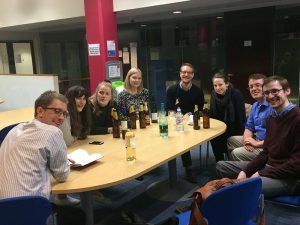 Over the years, the departments of history at UNC-CH and King’s College London (KCL) have built a strong partnership that now includes graduate student programs, conferences, and co-edited books. Most recently, UNC-CH hosted a graduate student conference, which marked the end of the seventh annual UNC-CH/KCL Graduate Student Workshop on Transatlantic Historical Approaches. The annual graduate student workshop is a longstanding feature of the interdepartmental collaboration, supported in part by the UNC-CH Graduate School. Each year, the workshop includes three graduate student pairs, each comprised of one student from UNC-CH and one from KCL. This year, the pairs first presented their work at a conference in London in May, and they met for a second conference in Chapel Hill in September. After each conference, the graduate students spent a day together, reflecting upon and working through the comments and questions raised during their conference panels. That the graduate student pairs participate in two conferences is a particularly innovative aspect of the workshop, as it allows the students to develop their projects in tandem. “The hope is that the May paper will help them see how their research projects intersect or differ, and then in September they can present new research based on material gathered during the summer,” explained UNC-CH student coordinator Mark Reeves, who participated in the UNC-CH/KCL Workshop last year. Although the workshop has a transatlantic focus, Reeves and other organizers try to draw graduate student participants from a variety of fields of history. Often, the creative graduate student pairings that result demonstrate that projects with disparate geographic or temporal focuses can have thematic or methodological commonalities. One such pairing was Alyssa Bowen of UNC-CH and Christian Melby of KCL. Bowen’s workshop paper examined British opposition to Chilean leader Augusto Pinochet’s junta in the 1970s, while Melby’s paper focused on British invasion scares in the late nineteenth and early twentieth centuries. These papers had important thematic overlaps. “Our papers both examined the interaction between nationalism/national identity and public opinion, particularly the way fear of ‘others’ can provide the rationale for political action,” Bowen said. Participant Lenny Hodges, a graduate student at KCL, found the different perspectives that he and partner Garrett Wright brought to their work on the French empire to be particularly helpful. “Forming a joint panel with Garrett was especially rewarding, as our different focuses and approaches to the French early modern empire complemented each other in a meaningful way,” Hodges explained. These different focuses and approaches often reflect the fact that the graduate students come from distinct academic cultures. “You’re getting feedback not just from a colleague in your field that’s working on a similar topic, but also from someone who’s emerging from a different intellectual context,” faculty liaison and UNC-CH Director of Graduate Studies Chad Bryant said. “So the questions you get are very valuable. The comments you get are very valuable.” The relationships developed during the annual UNC-CH/KCL Graduate Student Workshop sometimes continue long after the workshop ends, which only furthers the supportive relationship that the departments share. Some former UNC-CH participants have included King’s College professors on their dissertation committees, and others have built strong global networks. “My colleague in last year’s workshop has proven a critical link to my research in Nigeria, which she hails from and works on,” Reeves said. “These connections thus reach far beyond the year’s workshops as friendships and professional connections.” UNC-CH graduate student Elizabeth Hasseler and KCL partner Anais Waag also participated in the workshop this year. Commentators from UNC-CH at the September conference included faculty members Marcus Bull and Lloyd Kramer, as well as postdoctoral fellow Dr. Kyle Mays. While many view the UNC-CH/KCL Graduate Student Workshop as the highlight of the collaboration, members of the two departments have worked together on a number of other projects. Faculty at both schools have hosted conferences which bring in scholars from other institutions. Recently, one such conference resulted in a book, Walking Histories: 1800-1914 (2016). Edited by Chad Bryant and KCL professors Paul Readman and Arthur Burns, Walking Histories examines the meaning and practice of walking in a number of times and places. –Aubrey Lauersdorf Griffin Creech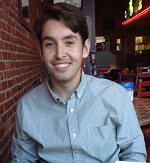 Griffin Creech ’16 won the 2016 Raymond J. Cunningham Prize awarded by the American Historical Association for the best article published in a history department journal in the academic year 2015-2016 written by an undergraduate student. His article, “‘Our Revolutionary Cadres Are Always Beside the Masses’: Reconsidering the Role of Khmer Rouge Cadres in Democratic Kampuchea,” appeared in Traces: The UNC-Chapel Hill Journal of History (Spring 2016). The essay had its origins in a paper Creech wrote for an undergraduate seminar on the long 1968 viewed in a global perspective taught by Donald Reid. Creech joins two other UNC-CH graduates who have received the Raymond J. Cunningham Prize for articles published in Traces: The UNC-Chapel Hill Journal of History: T. Fielder Valone ’11 (2012) and Michael Welker ’14 (2015). Kathleen Duval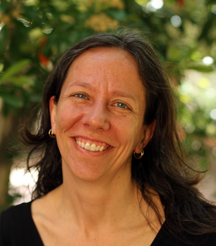 Bowman and Gordon Gray Distinguished Term Professor Kathleen Duval’s Independence Lost: Lives on the Edge of the American Revolution (2015) has won the 2016 Deep South Book Prize given by the Frances S. Summersell Center for the Study of the South at the University of Alabama for the best book on the history of the Deep South published in the last two years. Emily Burrill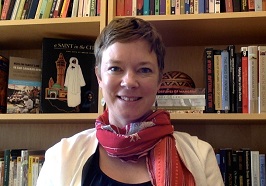 Emily Burrill won the 2016 Alf Andrew Heggoy Prize awarded by the French Colonial Historical Society, for her book States of Marriage: Gender, Justice, and Rights in Colonial Mali (2015). She is the director of the African Studies Center at UNC-CH and has a joint appointment in History and Women’s & Gender Studies. The Alf Andrew Heggoy Prize “recognizes the best book dealing with the French colonial experience from 1815 to the present.” Books published in any discipline in the previous year are considered. She joins our colleague Daniel Sherman, who won this prize in 2012. Karen Hagemann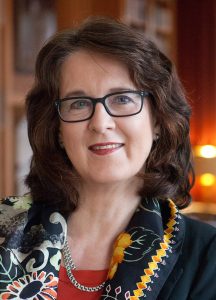 Karen Hagemann, James G. Kenan Distinguished Professor, has won the 2016 Hans Rosenberg Book Prize for Revisiting Prussia’s Wars against Napoleon: History, Culture and Memory (2015). The prize is awarded by the Central European History Society for the best book in Central European history published in English the previous year by a permanent resident of North America. Our colleague Chad Bryant received this prize in 2008. Konrad Jarausch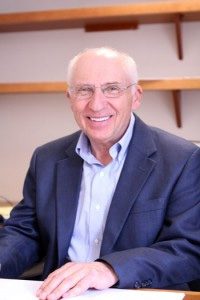 The College of Europe in Bruges and Natolin/Warsaw awarded the 2016 Bronislaw Geremek Prize to Lurcy Professor of European Civilization Konrad Jarausch for Out of Ashes: A New History of Europe in the Twentieth Century (2015). The Bronislaw Geremek Prize is awarded annually for “an outstanding academic book in the broadly defined field of the history and civilization of Europe (from antiquity to the twenty-first century).” |
| Faculty Spotlight |
ViewFrom Historian to Photographer: Peter Filene Reflects on the Art World and his Time at UNC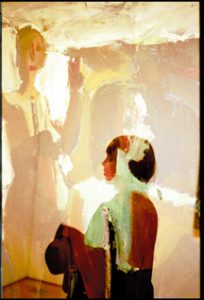 Within the department, Peter Filene is known for being an extraordinary teacher, the longtime director of the Committee on Teaching, the namesake of the department’s TA award for creative teaching, and a committed mentor to graduate students. Since his retirement, Filene has exchanged the world of academia for the world of art, but he has never forgotten his passion for teaching. Today, Filene is a prominent local photographer, an interest inspired by his experiences in the classroom. As a professor, Filene was known for his use of visual “texts,” and he challenged students to think about the theoretical and practical problems of sources. Teaching students how to “read” photographs, paintings, and films as historical sources eventually motivated Filene to teach a course on the history of photography, a decision that led him to begin taking photographs himself. “I began to feel wistful for an expression of myself that went beyond words and beyond archive research,” Filene explained. “I said, I need some sustenance for my soul and began making black and white photos.” Filene became committed to developing his skills as a photographer, enrolling in various workshops and courses, including a summer school class at UNC-CH. Now, Filene is one of the members of the Franklin Street Arts Collective, more commonly known as the FRANK Gallery, which is located on East Franklin Street in Chapel Hill. FRANK is operated by its artist members; a gallery manager is the only paid employee. Artists not only display and sell their work, but volunteer with the day-to-day tasks of running the gallery. Of Filene’s series of photographs, some of which are on display at FRANK, Double Exposures is particularly striking. Double Exposures was Filene’s first attempt at fine art photography. To create the pieces in this series, including the ones you see here, Filene takes a photograph, then does not advance the film so that he can take a second photograph over the first. The images appear superimposed on one another, and it is often difficult to tell where one photograph ends and the next begins. 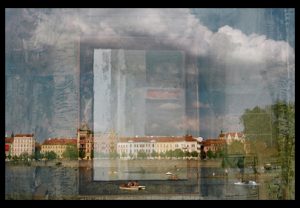 Filene stumbled upon this method. He had been wandering the streets of Paris, taking photographs of shutters, when it occurred to him to try something different. “I thought, you know, this photo’s going to turn out just like the others. What is it that I’m imagining should be happening here? If only I could paint on top of the photo, but I can’t. It was one of those ‘aha’ moments, built out of an impasse,” Filene recalled. He was inspired to take a photograph of an abstract painting in an art gallery across the street without first advancing the film. “And it was beautiful,” Filene said. “Suddenly I thought, I’m onto something here. And I kept doing it—double exposures.” Double exposures continue to interest Filene because of what he calls “the marriage of intention and chance” inherent in the method. He will walk the streets of Paris or New York to find what seems like a perfect image to superimpose upon his first photograph, but he’ll never quite know how the final product will look until he returns to the darkroom to develop the film. In one of Filene’s more recent series, Peeling Posters, he captures the effects of weather and time on posters. Geometric lines reminiscent of a cityscape are interspersed with the brilliant, sometimes clashing colors of the layered posters, seemingly reflecting the whirlwind of urban life. Filene has come to realize that his historian’s mind has shaped the focus of this series, even if he did not necessarily realize this influence when he began shooting. “Somebody much later pointed out to me: don’t you think that, as an historian, you’re attracted to things that happen over time? And I said—Wow! I wasn’t conscious of that. … These double exposures are also made over time. Time awareness is built into the way I look at things,” Filene explained. Besides being a prominent local photographer, Filene is a published novelist, and he also teaches retired adults. While fiction remains an interest, Filene is currently focused on nonfiction writing. He is finishing a book that uses short biographies to examine the relationships between fathers and sons and the meaning of fatherhood in United States history. While Filene is greatly enjoying the art world, he has very fond memories of his time in the Department of History at UNC-CH. “I remember my students, especially the graduate students because they hang around for a long time and there’s a real relationship there. … I loved the undergraduates from the get go. Graduates students, well, reminded me of graduate school. And then I started [advising graduate students], and it was so rewarding. So, if they’re out there, they ought to know that I’m grateful to them,” Filene said. “I couldn’t have had a better life than teaching history at Carolina.” –Aubrey Lauersdorf |
| Alumni Spotlight |
ViewKatie Ziglar Comes Home to UNC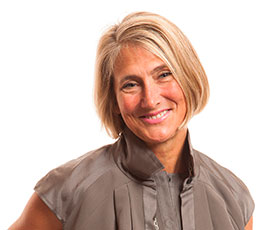 In 1975 UNC-CH awarded the first Morehead-Cain scholarships to women. Among the first female recipients was Katie Ziglar ’79, who agreed it was “high time” the university accepted women into the prestigious program. Ziglar fell in love with history and art as an undergraduate at Carolina—especially after taking courses in Japanese history with Miles Fletcher and in Islamic Art. Her career has taken her full circle, from an undergraduate at UNC-CH, to studying Islamic Art in Cairo, working at the National Gallery in Washington D.C., then on to the Smithsonian’s American Art Museum, the Clark Institute, the Freer and Sackler Gallery, and finally back to Carolina to take the helm of the Ackland Art Musuem. Ziglar’s career has been a whirlwind of exciting opportunities and commitment to public engagement fueled by a deep love of history she cultivated at Carolina. When Ziglar came to UNC-CH as an undergraduate she recalled, “I had always loved history, so it was an easy choice” to major in history, especially since “we had a great department, and still do.” She remembers warmly a diversity of courses, including German history with Lamar Cecil. Her courses in Japanese History and Islamic Art inspired her to think about history from a non-western perspective. Ziglar was intrigued and found it incredibly rewarding to study “where east and west meet each other.” One of the things she loves about history is how “it combines a lot of different fields of knowledge.” Ziglar’s career is indicative of multiple influences and interests converging in history and art. After a brief stint as a paralegal, which “cured” her from pursuing a career in law, Ziglar made the move to Egypt to study Islamic Art and Architecture at the American University in Cairo. “It was both exhilarating and challenging,” Ziglar said as she recounted donkeys pulling carts filled with fresh mounds of mint and stuffed grape leaves. Upon returning to the U.S., Ziglar learned that the National Gallery in Washington D.C. was doing an exhibit on Suleiman the Magnificent and needed someone in the press office who knew about the history of the Ottomans. Ziglar, with her training in history and art history at UNC, as well as in Cairo, jumped at the opportunity to pursue her love of art and history together. After more than six years, Ziglar moved on to the American Art Museum. where she really immersed herself in American art, drawing on her training in American history at UNC-CH. In one of her next moves Ziglar became Executive Director of External Affairs for the Freer and Sackler Gallery, where she was excited to be a part of an institution that “specializes in Asian art from Istanbul to Tokyo.” During her 13-year tenure at the Freer and Sackler, the gallery put on exhibits ranging from Islamic Spain to archaeology in Saudi Arabia. Ziglar enjoyed the opportunities for travel, collaboration, and the historical art of “putting the pieces together of parts of the past.” When the Director’s position at the Ackland opened up Ziglar said, “I never thought I would get the job.” It had been years since she’d been on the job market and she thought of this as an opportunity to practice. What started as a practice run for Ziglar turned into a new position as Director of the Ackland. Since starting this July, Ziglar has kept herself extremely busy, getting to know the people, culture, and politics at UNC-CH. She has met individually with every employee at the Ackland so that she can “understand not only what they do, but the challenges they face, and really come to know the culture of the Ackland.” That commitment to understanding people, place, and culture seems to come naturally to Ziglar who, deservedly so, is quite proud of the Ackland’s engagement with students. Ziglar is hopeful that the Ackland can expand its influence and offerings to the university community. She says that it feels good to be back at UNC-CH. While the Department of History has changed since she was a student in the 70’s, Ziglar is looking forward to making new connections and “just wish[es] I had time to go to class once in a while, I’m very jealous.” One aspect of her work with art history that Ziglar especially appreciates is that, “like history, it involves many other disciplines” which encourages collaboration and diverse approaches—part of what brought Ziglar to history in the first place. Ziglar parted with some words of wisdom for current history students, imploring undergraduates and graduate students alike “to not worry too much about career paths. If you’re bright, and committed, and hardworking, and have a little luck along the way you’ll end up doing just fine.” Indeed, Ziglar’s career is a testament to the rewards of the unexpected and the fascinating opportunities open to historians. –Danielle Balderas Alum Dr. Gordon “Nick” Mueller Reflects on his Time at the National World War II Museum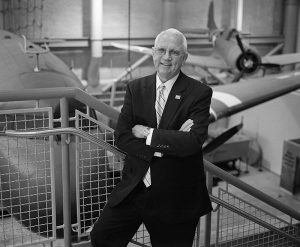 In 1990, UNC-CH alum Dr. Gordon “Nick” Mueller, then a professor and administrator at the University of New Orleans, was approached by colleague Stephen Ambrose to start a modest museum to honor those who participated in D-Day. Mueller, whose graduate training in modern European history under Carl Pegg helped prepare him for the project, shared Ambrose’s enthusiasm. Neither Mueller nor Ambrose would have expected that, twenty-six years later, their idea would have grown into the National World War II Museum, one of the most popular museums in the United States. After ten years of planning and development, the National D-Day Museum opened in 2000. A number of U.S. Congress members attended the opening. Two guests, Senators Daniel Inouye and Ted Stevens, presented Mueller with an offer: if he agreed to expand the museum to encompass the entire U.S. military experience in World War II, they would find funding. Soon, Mueller and his museum received congressional appropriations to purchase three city blocks in New Orleans’ Warehouse District, and construction of additional museum buildings began. Now, visitors can walk in the shoes of an American soldier in the European or Pacific theater of the war in the Campaigns of Courage Pavilion. They can see tanks, trucks, and airplanes in the U.S. Freedom Pavilion. Or they can visit the Louisiana Memorial Pavilion to view the original D-Day exhibit. There is an excellent article on the museum and Mueller’s role in its creation and development in the November/December 2016 Carolina Alumni Review. Mueller’s transition from professor and administrator to National World War II Museum President and CEO was unexpected, but his career as a research historian and an educator made him well-prepared for developing a museum. “[You use] many of the same attributes that you acquire trying to research history, to write about it, to teach about it. You have to study a vast amount of resources and you have to learn how to compress the data, the history, the research that you’ve done into something that communicates a clear, compelling story,” Mueller said. “Those years of teaching and training in history were absolutely critical in helping me develop the vision for what we wanted to create, first in the National D-Day Museum, and after that.” Now, Mueller is preparing to retire after sixteen years as President and CEO of the National World War II Museum. In the meantime, he is developing the Institute for the Study of War and Democracy at the museum, which will ensure that the museum remains engaged with and responsive to cutting-edge scholarship. Simultaneously, Mueller is raising money to digitize the museum’s collections, which include 150,000 photographs, 8,000 oral histories, 100,000 artifacts, and thousands of documents. “This is not a museum just for people who come here,” Mueller said. “It has got to be a museum that provides some of the most exciting history on the origins, and the war itself, and the postwar era, and exports that knowledge and information, those maps and oral histories, around the world.” Mueller is already contemplating future projects after his retirement. He hopes to undertake a comparative study of the public memory of World War II in the United States and other nations, a project inspired by his time at the National World War II Museum. “I think people would be very surprised to learn that WWII is not viewed in public memory [in other countries] in this same way Americans do,” Mueller explained. “[Historical memory] is a whole growing field of history for historians, and as a museum … we have a responsibility to the public narrative, but we also have a responsibility to question that narrative, even after it’s designed and developed and put in place in our exhibits.” –Aubrey Lauersdorf |
| History in Our World |
ViewWhere History Meets Journalism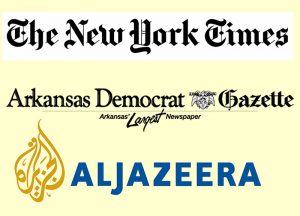 In 1902 The New York Times ran an Op-Ed entitled “Journalism and History” in which the Times went head to head with Rev. Dr. Parkhurst over the relationship between history and journalism. Dr. Parkhurst adamantly defended the superiority of history when compared to journalism. But the Times did not back down: “We think that he errs when he finds journalism a hindrance to the writing, the reading, or the making of history.” More than a century later we are still revisiting this question of the relationship between history and journalism. In the Department of History here at UNC-CH we have faculty members, graduate students, and alumni with varying degrees of journalistic involvement and ambition who would no doubt take issue with some of Dr. Parkhurst’s pronouncements. However, this debate over history and journalism provides a window through which to rethink our own discipline and the ways we relate to the public. Molly Worthen, Assistant Professor of History, dons multiple caps as both historian and journalist. She teaches a diversity of courses in American religious and intellectual history and recently published Apostles of Reason: The Crisis of Authority in American Evangelicalism (2013). As a New York Times Contributing Op-Ed writer, Worthen approaches her journalistic endeavors, in which she writes about religion, politics, and ideology, as an opportunity to hone her craft as a historian. “I think that my journalistic writing keeps me honest,” Worthen said. “There’s a way in which as professional academics we can get spoiled by writing solely for our colleagues, who already understand our jargon and our assumptions, and it can lead to bad writing and lazy thinking.” Writing for a broader public audience, combined with the limitations of shorter word counts, requires a crystallization of ideas and arguments. As Worthen explained, “you have to make a lot of painful compromises when you write short pieces for a popular audience,” but “there’s a real art to that simplification that makes you a clearer thinker and a better teacher and a better historian.” Worthen has managed to keep her feet in two fields—history and journalism—an identity shared by one of the department’s PhD students as well. A former interviewer and producer for Al-Jazeera English, Samee Siddiqui reflected on his work in broadcast journalism in London and Doha before pursuing his doctorate. After finishing his MA in Japanese Studies, Siddiqui realized he wanted to continue doing in-depth research; journalism provided him with that opportunity. However, after working in broadcast journalism Siddiqui realized “that general historical illiteracy was even worse than I had imagined”—especially “for those regions where there are strong geopolitical interests.” At UNC-CH, Siddiqui is studying the connection between Japan and the “Muslim World.” Rather than disengaging from journalism, Siddiqui’s experience has convinced him that it is crucial for academics to engage with the media—albeit in diverse ways. He continues to contribute articles to Al-Jazeera, writing about Japanese history and politics. However, he thinks that the real question isn’t whether engaging is important, but rather how academics engage with the media. “Engaging doesn’t have to necessarily be writing articles or giving interviews,” Siddiqui said, “It could arguably be more fruitful to educate people in the media who cover the topics you are looking at.” Claire Williams ’15, a recent graduate who majored in history at UNC-CH, has fully immersed herself in the world of journalism, covering agriculture for the Arkansas Democrat-Gazette. Williams grew up pouring over her parents’ issues of National Geographic, “reading and re-reading” all of the history-related articles. Abandoning plans for law school after she started to work at the Daily Tarheel, Williams saw a major in history as the natural companion to a career in journalism: “Being a journalist gives you a chance to witness history.” “My degree in history,” Williams reflected, “helps me be skeptical of sources, to think deeply about the issues I’m writing about, and to put issues in long-term context.” While not many of her colleagues have a background in history, Williams has learned that it is helpful to have training in an area other than journalism. For Williams, history and journalism are intimately tied to one another. Viewing journalism as “the first draft of history,” she said, “I hope that, someday, a historian is able to find my articles in an archive and explain the things I write about with the benefit of hindsight and much, much more time than I have,” Williams said. This fall Williams held an Arthur F. Burns fellowship, which allowed her to live in Munich and write for the Süddeutsche Zeitung. There she wrote articles on the Roma in Europe and Arkansas, meat stem cell experimentation for grocery store products, and lobbying overseas by American states. Clearly Worthen, Siddiqui, and Williams have made connections between history and journalism in their own careers. So, whether historians work as journalists or develop working relationships with them, there is no denying that history and journalism enjoy a closeness that harbors the opportunity for creative collaboration. Worthen reflected that not only has her work in journalism made her a better historian, but also that “having to write these articles has made me a more thoughtful citizen.” “It’s important,” Worthen concluded, “not to fetishize any one part of our job,” recognizing that we need to “push the boundaries of knowledge,” while not being held “captive to the whims of the masses.” Undoubtedly we will continue to explore the relationship between history and journalism as we seek a balance between our academic commitments and duty to the public. –Danielle Balderas |
| Out of the Archives |
ViewOne History Professor’s Activism in WWII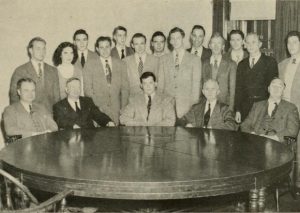 In the summer of 1945 UNC-CH accepted its first Japanese-American student, Shizuko Hayashi, largely thanks to the activism of UNC-CH historian Howard K. Beale. As part of a larger project to resettle Japanese-American college students during internment in World War II, Beale became deeply involved in lobbying the University to admit Japanese-American students who were no longer allowed to attend colleges in the West Coast “security zone.” Born in Chicago in 1899, Beale first came to UNC-CH in 1935 after stints at New York University and Bowdoin College. An influential historian of Reconstruction, he challenged the then dominant Dunning School which championed white resistance to Reconstruction. He helped pioneer the revisionism of the 1930’s, which focused on economic interpretations of Reconstruction. While at Carolina, Beale trained C. Vann Woodward and wrote on academic freedom and imperialism. As WWII erupted, Beale served as an advisor to conscientious objectors before becoming involved with efforts to help Japanese-American students. After Pearl Harbor, the U.S. government enforced the incarceration in camps for the duration of the war of over 100,000 people of Japanese ancestry living on the Pacific Coast, the majority of whom were U.S. citizens. Miles Fletcher, professor of history at UNC-CH, noted that shortly after FDR signed Executive Order 9066, which authorized the creation of “military zones” from which Japanese-Americans could be deported, Beale became committed to helping relocate students who were affected by internment. Japanese-American college students who attended school in the “military zones” were forced to leave their universities, inspiring the creation of the National Japanese-American Student Relocation Council (NJASRC) to help these students find universities they could attend outside of the West Coast. Once the Japanese-Americans were interned, Beale became involved in the NJASRC, leading him to San Francisco where he became the director of the organization’s West Coast branch. With the support of the UNC-CH Department of History, Beale worked tirelessly in San Francisco, although his stint as director did not last long—he resigned after only two months. Professor Heidi Kim in the UNC-CH Department of English and Comparative Literature, who is currently researching Howard Beale, said that although “he was working extremely hard, let us say his leadership style did not work in the San Francisco office.” The NJASRC had strong ties to the American Friends Service Committee and was mostly staffed by Quakers. According to Kim, the West Coast office liked to start every morning with meditation—and Beale just couldn’t get on board with the “group ethos” style of leadership. While he was in San Francisco he worked unceasingly—he would spend all day on the job, break for dinner and perhaps take a walk, and then head back to work. Beale’s efforts did not stop once he left San Francisco. After returning from his leave of absence, which Kim says Beale had secured by sending UNC-CH President Frank Porter Graham a telegram that, in effect, said, “I’d like to take this semester off, can you please fix it up?,” Beale continued his efforts to bring Japanese-American students to UNC-CH. With the support of Frank Porter Graham, who had taught in the Department of History at UNC-CH until 1930, and Reverend Charles Miles Jones, Beale worked against the “skeptical” faculty advisory committee and Dean Robert House. Finally, his efforts paid off. Shizuko Hayashi was admitted to UNC-CH in the summer of 1945 to pursue a master’s degree in social work. The only Japanese-American student at UNC-CH, Hayashi was joined in the spring of 1946 by Kayelise Kaneda, who came to work with Howard Odum in the Sociology Department. In 1948, Beale left UNC-CH for the University of Wisconsin, where he spent the rest of his academic career until his death in 1959. In addition to his work supporting the resettlement of Japanese-American students, Beale was involved with numerous liberal causes throughout his life. He was active in the American Civil Liberties Union, served as director of the National Association for the Prevention of War, and remained a critic of government censorship. Reflecting on Beale’s activism during WWII, Professor Kim stressed that while Beale could certainly be difficult to work with at times, when reading his correspondence, “you can feel his conviction, and with that you can feel his frustration.” That conviction, and corresponding frustration, drove Beale in his academic and public endeavors at Carolina. –Danielle Balderas |
| Graduate Student News |
ViewGraduate Student News – Fall 2016I often offer my advisees much unsolicited advice. One such pearl of wisdom is always to take time to celebrate achievements, especially those of colleagues and friends. Here, it is my pleasure to take my own advice. A proper place to begin, perhaps, is by recalling last May, when thirty-one of our own obtained their doctorates, having completed dissertations on a wide range of topics: veterans of France’s war in Algeria; war and US occupation in Cuba; Latinas in the Jim Crow South, Chinese rule in Tibet; and tea in Russia. Since 1926 the History Department has conferred 877 PhD degrees. We are remarkably proud of our graduates’ many successes. Just this last year, for example, Elizabeth Ellis accepted a tenure-track job at New York University. Christina Carroll did the same at Kalamazoo College. Gary Guadagnolo and Jeanine Navarrete accepted positions as senior analysts at the Educational Advisory Board in Washington, D.C. Another recent graduate, Waitman Beorn, was named executive director of the Virginia Holocaust Museum. We want to hear more from our alumni, too! In the coming months our graduate alumni list-serv will be up and running. We also hope to elicit advice from our alumni as we continue to improve our efforts at professional development. In the meantime, I encourage you to write me with news. At the other end of the spectrum, the program welcomed eighteen incoming students this fall. Their admission, too, was a remarkable achievement, as the department received nearly three hundred applications to the PhD program last year. And our current students continue to win accolades. Virginia Olmsted was recently awarded a Fulbright-Hayes to conduct research on Soviet fashion. Mary Elizabeth Walters received an ABC-CLIO Research Grant from the Society for Military History and an Allen R. Millet Dissertation Research Fellowship from the Society for Military History. Jessica Wilkerson received the Herbert G. Gutman Prize from the Labor and Working-Class History Association for her dissertation, “Where Movements Meet: From the War on Poverty to Grassroots Feminism in the Appalachian South.” Thus, our program continues to thrive and to innovate, despite a lack of funding that places financial pressures on our students and often puts us at a monetary disadvantage with our peer institutions. Our graduate students remain central to our pedagogical mission, whether teaching their own courses or cooperating with faculty in their roles as Teaching Assistants and Graders. Our graduate students form the core of numerous intellectual gatherings, including many of the university’s Carolina Seminars, speakers’ series, and individual lectures. As I write, several of our graduate students are preparing to host the department’s eighth annual graduate student workshop with King’s College, London next spring. We cannot tabulate the long hours at the library that allow for new insights and publications. Uncounted, too, are the many conversations and seminar discussions that bring intellectual vibrancy to our department. Our graduate students, in short, are the core of our department, and that, perhaps, is the most important thing to celebrate. –Chad Bryant, Director of Graduate Studies |
| Undergrad News |
ViewUndergraduate Student News – Fall 2016This fall semester, some 3750 students were enrolled in History Department courses, nearly 500 UNC-CH students were majoring or double-majoring in history, and another 300 or so were history minors. Although nationally, history enrollments have been declining, UNC-CH’s Department of History continues to attract students through its excellent teaching, diverse and intriguing course offerings, and stress on vital skills of research, analysis, and communication. History majors are deeply engaged in their own, guided research projects. Eight sections of History 398, the Department’s capstone research seminar, were offered this fall, on topics including “The Civil War: Lived Experience,” “Florence: Cradle of the Renaissance,” “Slavery, Race, and Memory at UNC,” and “Antisemitism: History, Causes, Consequences.” Students in these seminars learn not only about their topics, but also about how to do research and craft a significant piece of historical scholarship of their own. The author of the best of these research papers is awarded the annual Josh Meador Prize at the department’s spring reception. In an additional research option, ten highly ambitious students are now enrolled in the year-long seminar leading to the production of a senior honors thesis. Through generous donor funding, four of them traveled to archives this past summer and another three did so during breaks this fall, in order to pursue their research in original sources. Several history majors each year also receive departmentally-administered, externally funded grants to help defray the costs of their life-changing study abroad programs. The Department’s undergraduate program is administered largely through its Undergraduate Studies Committee, composed of select faculty members and undergraduate students. This year more than thirty students applied for the four open seats. The Committee’s first order of business is to consider and hone new history courses proposed by department faculty. We added nine new courses to the department’s offerings this year, on topics including “Dictators in the Twentieth Century” and a research seminar on “My Hometown.” We also continue to evaluate the effectiveness of our program through student surveys and assessments of student research projects. Not only do students participate in the Undergraduate Studies Committee, but they are involved in UNC-CH’s chapter of Phi Alpha Theta (the national history honor society), and the newly revitalized History Club. Students can stop in the department office for free cookies every Tuesday afternoon, and the “Take a Historian to Lunch” program is in its third year of bringing faculty and students together for informal yet inspiring interactions. Ethan Tyler won the 2016-17 Kusa award, which he used this past summer to do senior thesis research in London. His thesis is on British imperialism in the Persian Gulf region, particularly in Kuwait, in the late nineteenth and early twentieth centuries. He is working with Sarah Shields. Ruoyu Ji won a Boyatt research award to conduct research in the Harvard Library for a thesis on French views of China in the 18th century, under the direction of Lloyd Kramer. A brand-new Jonathan Lewis Archival Research Fellowship was awarded to Georgia Brunner and Michael Hensley for their senior thesis research: Brunner is working on the aftermath of the Rwandan genocide with Lauren Jarvis and Hensley is working with Marcus Bull on “Eyewitness, Self-Perception, and Identity in the Alexiad.” Last spring, Boyatt scholarships to support study abroad programs were awarded to history majors Perla Castillejos, who studied in Ireland, and to Emily McKinney, who studied in Scotland. This fall, Boyatt study abroad scholarships went to history majors Marigny Kirschke-Schwartz (University of New South Wales), Ryan Kurtiak (University of Edinburgh), Grace Porter (Université de Montpellier), and Nick Teder (University of New South Wales). –Lisa Lindsay, Director of Undergraduate Studies |
Gifts to the History Department
The History Department is a lively center for historical education and research. Although we are deeply committed to our mission as a public institution, our “margin of excellence” depends on generous private donations. At the present time, the department is particularly eager to improve the funding and fellowships for graduate students.
Your donations are used to send graduate students to professional conferences, support innovative student research, bring visiting speakers to campus, and expand other activities that enhance the department’s intellectual community.
 |
To make a secure gift online, please click “Give Now” above.
The Department also receives tax-deductible donations through the Arts and Sciences Foundation at UNC-Chapel Hill. Please note in the “memo” section of your check that your gift is intended for the History Department. Donations should be sent to the following address:
UNC-Arts & Sciences Foundation
Buchan House
523 E. Franklin Street
Chapel Hill, NC 27514
Attention: Ronda Manuel
For more information about creating scholarships, fellowships, and professorships in the Department through a gift, pledge, or planned gift please contact Ronda Manuel, Associate Director of Development at the Arts and Sciences Foundation: ronda.manuel@unc.edu or (919) 962-7266.

